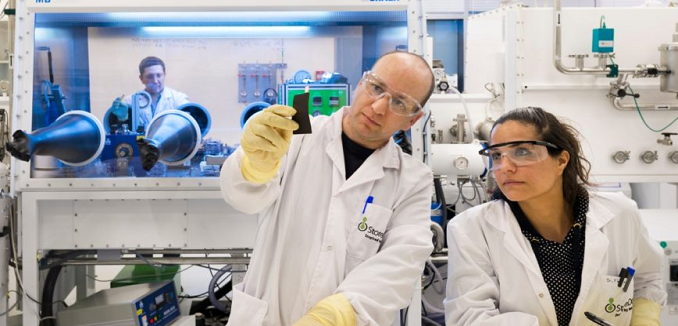As consumers increasingly consider making their next car purchase electric, two major trade-offs are stalling the transition from gasoline-powered vehicles. Electric-car range remains limited and recharging the battery can take from 45 minutes to several hours.
Manufacturers have been trying to boost the battery’s chemical “density,” so an electric car can travel farther on a charge. The latest high-end electric vehicles from Tesla, Chevrolet and others now have a range of up to 300 miles under optimal conditions.
But recharging is still slow. Israeli start-up StoreDot hopes to jumpstart the electric vehicle revolution by addressing this second trade-off.
A StoreDot Flash Battery can be filled to capacity in just five minutes, providing the same 300 miles of range. That makes it no less cumbersome than driving a gasoline-powered car, Doron Meyersdorf, the company’s cofounder and CEO, tells ISRAEL21c.
StoreDot’s batteries can be built in the same form as regular electric batteries, using the same basic material – lithium –which should lead to easier adoption. But StoreDot replaces the graphite used by all other electric battery manufacturers with a mix of metalloids including silicon and proprietary organic compounds synthesized in its labs.
This not only improves charging time but also safety. Heating graphite is “what made batteries explode in Samsung’s Galaxy Note 7,” Meyersdorf notes, and in 2013 several of Tesla’s Model S cars caught fire.
“It’s a known problem and the reason why all such batteries are charged slowly. And it’s also why our technology is garnering such interest.”
“Interest” might be an understatement. Last year, StoreDot scored major votes of confidence from two strategic partners – a $20 million investment from BP Ventures (the multinational oil and gas company sees an electric future and hopes ultimately to convert its 18,000 gas stations to electric charge stations, Meyersdorf says); and EVE Energy, a Shenzhen-listed manufacturer of lithium batteries, which intends to manufacture StoreDot batteries in China.
The BP and Shenzhen agreements come on top of a $62 million funding round in 2017 led by German car giant Daimler AG.




